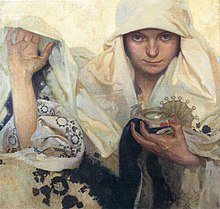Destiny
This article possibly contains original research. (July 2023) |
Destiny, sometimes also called fate (from
Fate

Although often used interchangeably, the words fate and destiny have distinct connotations.
- Traditional usage defines fate as a power or agency that predetermines and orders the course of events. Fate defines events as ordered or "inevitable" and unavoidable.[citation needed] This is a concept based on the belief that there is a fixed natural order to the universe, and in some conceptions, the cosmos.
- Classical and European mythology feature personified "fate spinners," known as the mystic spinning of threadsthat represent individual human fates.
- Fate is the future scenario, which cannot be determined by decisions an individual will make. However, Destiny is about the present, where every decision an individual has made has led them to their present scenario.[citation needed]
- Fatalism refers to the belief that events fixed by fate are unchangeable by any type of human agency. In other words, humans cannot alter their own fates or the fates of others.[1]
Fortune
Distinguished from fate and destiny, fortune can refer to chance, or luck, as in fortunate, or to an event or set of events positively or negatively affecting someone or a group, or in an
Philosophy
Philosophy on the concepts of destiny and fate has existed since the Hellenistic period with groups such as the
The Stoics believed that human decisions and actions ultimately went according to a divine plan devised by a god.[citation needed] They claimed that although humans theoretically have free will, their souls and the circumstances under which they live are all part of the universal network of fate.
The Epicureans challenged the Stoic beliefs by denying the existence of this divine fate. They believed that a human's actions were voluntary so long as they were rational.[5]
In common usage, destiny and fate are synonymous, but with regard to 19th-century philosophy, the words gained inherently different meanings.
For Arthur Schopenhauer, destiny was just a manifestation of the Will to Live, which can be at the same time living fate and choice of overrunning fate, by means of the Art, of the Morality and of the Ascesis.
For
Psychology
Among the representatives of depth psychology school, the greatest contribution to the study of the notion such as "fate" was made by
]Religion
The concept of destiny, fate or causation is prominent in most religions – but takes different forms:
- The ancient Sumerians spoke of divine predetermination of the individual's destiny[8]
- In Assyro-Babylonian pantheon which included the Anunnaki who would decree the fates of humanity[10]
- Followers of Ancient Greek religion regarded not only the Moirai but also the gods, particularly Zeus, as responsible for deciding and carrying out destiny, respectively.
- Some Christians believe that humans all have free will, while others believe in predestination.[5]
- In qadaris the decree of God.
- Within Buddhism, all phenomena (mind or otherwise) are taught as dependently arisen from previous phenomena according to universal law – a concept known as paṭiccasamuppāda. This core teaching is shared across all schools of thought, and directly informs other core concepts such as impermanence and non-self (also common to all schools of Buddhism).
Politics
Metaphorical expressions of a predetermined destiny are commonly used by politicians to describe events not understood.
In
Literature
In ancient Greece, many legends and tales teach the futility of trying to outmaneuver an inexorable fate that has been correctly predicted. This portrayal of fate is present in works such as
In England, fate has played a notable literary role in Shakespeare's Macbeth (1606), Thomas Hardy's Tess of the d'Urbervilles (1891), Samuel Beckett's Endgame (1957), and W.W Jacobs' popular short story "The Monkey's Paw" (1902). In America, Thornton Wilder's book The Bridge of San Luis Rey (1927) portrays the conception of fate.
In Germany, fate is a recurring theme in the literature of
See also
- Ājīvika
- Causality
- Divine providence
- Karma
- Lazy argument
- Omniscience
- Oracle
- Predestination in Islam
- Prophecy
- Russian avos'
- Psychology of human destiny
- Synchronicity
- Yuanfen
- Wyrd
References
- ^ a b Lisa Raphals (4 October 2003). Philosophy East and West (Volume 53 ed.). University of Hawai'i Press. pp. 537–574.
- chain of prior occurrences.
- ^ Dietrich, B.C. (1962). The Spinning of Fate in Homer. pp. 86–101.
- ^ "The Wheel of Fortune" remains an emblem of the chance element in fate(destiny).
- ^ a b Karamanolis, George E. (2000). Vol. 1 of Encyclopedia of Greece and the Hellenic Tradition. Chicago, Illinois: Fitzroy Dearborn. pp. 610–611.
- ^ Beyond Good & Evil 13, Gay Science 349 & Genealogy of Morality II:12
- ^ Nagel, Thomas (1987). "Chapter 6". What Does it all Mean?. New York: Oxford University Press.
- ISBN 978-3161557538
- ^ "Nabu". Encyclopedia Britannica. Archived from the original on 2 July 2016.
- ISBN 0415198119
- ^ Henry Kissinger, 'Otto Von Bismarck, master Statesman', New York Times, 31 March 2011
- ^ Sophocles (1978) [427 BC]. Stephen Berg; Diskin Clay (eds.). Oedipus the King. New York: Oxford UP.
- OCLC 1065971941.
Further reading
- Kees W. Bolle, Encyclopedia of Religion. Ed. Lindsay Jones. 2nd ed. Vol. 5. Detroit: Macmillan Reference US, 2005. vol. 5, pp. 2998–3006.
- Tim O'Keefe, "Ancient Theories of Freedom and Determinism." The Stanford Encyclopedia of Philosophy
- ISBN 978-0982939147
- Robert C. Solomon, "On Fate and Fatalism." Philosophy East and West 53.4 (2003): 435–454.
- Cornelius, Geoffrey, C. (1994). "The Moment of Astrology: Origins in Divination", Penguin Group, part of Arkana Contemporary Astrology series.
